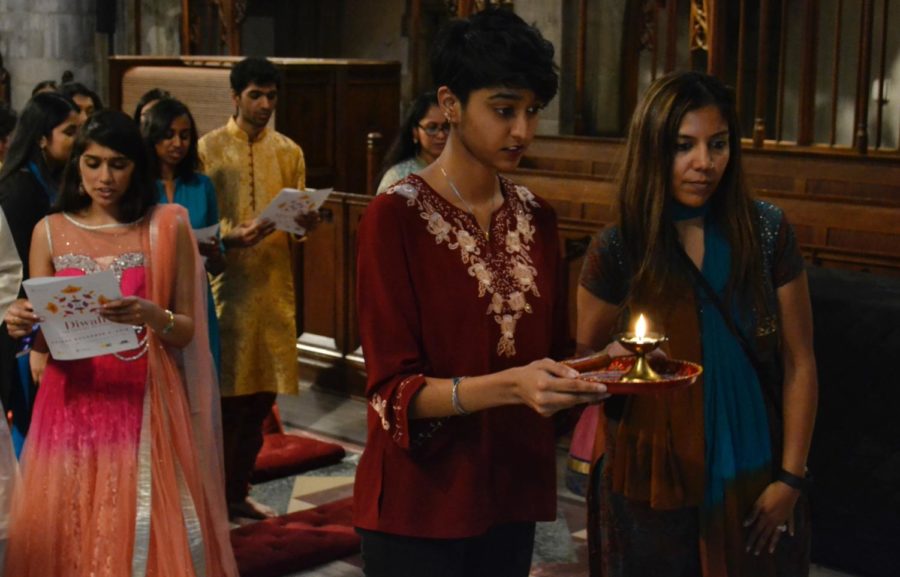The University of Chicago provides many opportunities for students of all religions, beliefs, and identities to engage with spiritual life on campus. To be exact, the University is home to 64 recognized spiritual groups, and counting, with many more to be explored off-campus.
For nondenominational and interdenominational Christian worship, try checking out Rockefeller Chapel, which hosts most ceremonies and worship on Sunday mornings. Smaller spiritual services are held at the more intimate Bond Chapel on the Quad.
Buddhists can connect with the Buddhist Association to become involved in on-campus meditation groups and retreats. Those interested can join Dharma Stream in Swift Hall for Tibetan meditation, try Soto Zen Buddhist Meditation in Rockefeller Chapel, or get involved with Wake Up UChicago for hour-long mindfulness workshops.
The Catholic community is anchored at the Calvert House, located across from the Quad at 5735 South University Avenue. Masses are held daily from Monday to Friday at 12:30 p.m., and Sunday masses are held at 11 a.m., 5 p.m., and 9 p.m. The Calvert House is additionally a useful resource for students looking to engage in community service, including projects such as the Homeless Food Run or Calvert House Tutoring.
Episcopalian students can check out Brent House at 5540 South Woodlawn Avenue. On every Sunday throughout the academic year, Brent House has Eucharist, which is subsequently followed by a home-cooked meal. All are welcome to engage in the Brent House’s programming, even if you belong to another faith or do not subscribe to religion.
Followers of Hinduism are encouraged to become involved in Hindu Student Sangam, which meets weekly in the prayer room at Rockefeller Chapel for bhajan recitation and spiritual discussion. Hindu Student Sangam also hosts events for Diwali and Holi, amongst other holy days.
Students looking to engage with Judaism may find themselves at Hillel on 5715 South Woodlawn Avenue, or at Chabad at 5700 South Woodlawn Avenue, but there are other ways to become involved with Jewish life on campus. Other groups, like the Student Alliance for Jewish Enrichment (which organizes Jewish cultural and educational programming in Hyde Park), the fraternity Alpha Epsilon Pi (AEPi), and a capella group Rhythm and Jews provide even more ways to explore Judaism at UChicago.
Muslim students can connect with each other in the Muslim Students Association, a group dedicated to organizing religious, social, and community service events in the university community. A prayer space is located in the basement of Ida Noyes for individuals and groups, and Jumu’ah Prayers are recited in Bond Chapel on Fridays at 1 p.m. and 1:45 p.m. (or noon and 12:45 p.m. following daylight savings).
Students can also join Ásatrú, Bahá'í, Confucian, Jain, Pagan and Wiccan, Quaker, Shinto, Sikh, Taoist, and Zoroastrian groups. The Spiritual Life office emphasizes a message of inclusion for all spiritualities and identities, noting on its website that it can also provide members of the LGBTQ+ community with resources to find spiritual groups that fully embrace them in rituals and leadership roles.
Additionally, Secular Alliance invites all atheists, agnostics, and secularists to examine the university and ethics through scientific and humanistic rationale. Secular Alliance hosts discussions, guest speakers, and special events throughout the school year.
Those interested in engaging with a mix of faiths may pursue interfaith leadership roles in the Spiritual Life Council or join the Spiritual Life Collective. The council is a student-led advisory board that meets biweekly to discuss spiritual diversity on campus and how students experience religious or spiritual identity. The Spiritual Life Collective is a group of students that meets weekly to participate in interfaith dialogue and leadership development, and additionally assist with event programming throughout the academic year.
Stop by the Spiritual Life office in the basement of Ida Noyes, located at 1212 East 59th Street, to ask questions about how to get involved with spiritual communities on- and off-campus and to meet the staff members who foster them. Regardless of what you believe, or if you believe, you can find a community on campus to discuss and explore your convictions.









